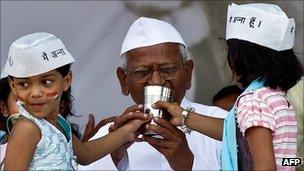Anna Hazare: India campaigner ends hunger strike
- Published

Anna Hazare took a glass of juice to end his fast
Indian anti-corruption campaigner Anna Hazare has ended a high-profile hunger strike in Delhi after 12 days.
He accepted a glass of fruit juice from a five-year-old girl.
His move came a day after MPs expressed support for proposed changes to anti-corruption legislation.
After nearly nine hours of debate, Finance Minister Pranab Mukherjee told parliament the "sense of the House" was behind Anna Hazare's key demands.
However, an expected vote on the proposals did not take place.
Mr Hazare, 74, had vowed not to stop until a tougher bill was passed, but doctors have warned that his health is deteriorating rapidly.
He has so far lost 7kg (15lbs) in weight and has refused medical advice to be put on an intravenous drip to help him rehydrate.
'Crossroads'
Opening Saturday's debate in Delhi on the proposed amendments, Mr Mukherjee said India was "at a crossroads", with the focus squarely on the country's parliamentary democracy.
Mr Mukherjee said that while there was support for Mr Hazare's proposals, a solution would have to be found within the Indian constitution.
Meanwhile, governing Congress party leader Rahul Gandhi said he had "serious doubts" that a single bill would end corruption.
Mr Gandhi told MPs that the problem could not "just be wished away" and thanked Mr Hazare for "helping people to articulate this sentiment".
"There are no simple solutions to eradicating corruption. But I have serious doubts that a single bill will end corruption. What we require is a set of effective laws," he said in a rare speech.
In April, Mr Hazare called off a hunger strike after four days when Prime Minister Manmohan Singh said he could help draft legislation to create a Citizens' Ombudsman, or Jan Lokpal, an independent body with the power to investigate politicians and civil servants suspected of corruption.
The final version of the bill was presented in early August, but Mr Hazare and other activists rejected it because the prime minister and senior judges would be exempt from scrutiny.
This week, the government appeared to agree to the demand that the prime minister would be brought under the ombudsman's jurisdiction.
Mr Hazare has also said parliament should come to an agreement on three more of his proposals:
The lower bureaucracy should be brought within the ambit of the ombudsman
Putting together a "citizen's charter" for time-bound disposal of public grievances against government
Bringing the anti-graft ombudsmen in the states under the federal anti-corruption watchdog
His campaign for the strengthening of the anti-corruption legislation proposed by the government has received widespread support, with tens of thousands of people attending protests across the country.
India has recently been hit by a string of high-profile corruption scandals including a telecoms bribery scam that may have cost the government $39bn (£23bn), alleged financial malpractice in connection with the Delhi 2010 Commonwealth Games and allegations that homes for war widows were diverted to civil servants.
Critics of the government say the scandals point to a pervasive culture of corruption in Mr Singh's administration.
A recent survey said corruption in Asia's third largest economy had cost billions of dollars and threatened to derail growth.
- Published28 August 2011
- Published25 August 2011
- Published17 August 2011
- Published15 August 2011
- Published15 August 2011
- Published4 August 2011